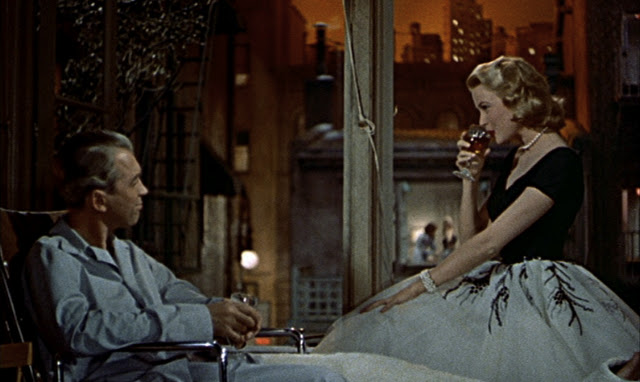WHO: Alfred Hitchcock
WHAT: The Wikipedia article on Rear Window claims that "analyses, including that of François Truffaut in Cahiers du cinéma in 1954, center on the relationship between Jeff and the other side of the apartment block, seeing it as a symbolic relationship between spectator and screen." Not exactly. Perhaps this is why Hitchcock fans have created their own Wiki, where it's possible to read Truffaut's review in full, and see he in fact evokes a different relationship: that between a filmmaker and the world being filmed.
Whether one defines Rear Window as about the spectator/screen or the filmmaker/world relationship may ultimately depend upon one's self-identification as a viewer or as a director (although Truffaut had not yet made his first short film in 1954, he'd surely planned and hoped to by then.) I'd argue, however, that the difference between these two frames is in fact at the crux of the film. If Rear Window is about the spectator and the screen, then Hitchcock has created a number of miniature movies about L.B. Jeffries' neighbors for him to watch during his convalescence. If it's about the filmmaker and the world, then Jeffries (James Stewart) is Hitchcock's avatar in their creation: in this case the stories he and Lisa (Grace Kelly) tell each other about "Miss Torso", "Miss Lonelyhearts" etc. are projections, patterns, and ways of interpreting the world (or making a film). It's only by involving himself with the stories on screen, by "directing" his actors Lisa and Stella (Thelma Ritter) to enter the framed world, that he can discover for sure whether the stories he's watching unfold are his own creations or not. By intervening he verifies that (at least the Thorwald story) is not a product only his own imagination, while at the same time ensuring his own role of authorship in the conclusion of the narrative.
WHERE/WHEN: Today only at the Castro Theatre at 2:00, 4:30 & 7:00.
WHY: When I last checked in on the Alfred Hitchcock screen scene over a month ago, two large retrospectives of the director's work were finishing up at different local venues. Now it's time for what I call "Phase 2" of the 2013 Frisco Bay celebration of the Master of Suspense.
The centerpiece of this phase is the "Hitchcock 9" a set of all but one of the first ten films directed by Hitchcock, each silent, recently restored thanks to the British Film Institute and its partners, and set to play two Frisco Bay venues this summer. First, the nine restorations' US premiere will be at the Castro Theatre June 14-16 thanks to the San Francisco Silent Film Festival. Musical accompaniment will be provided by the Mont Alto Motion Picture Orchestra, as well as pianists Stephen Horne and Judith Rosenberg- the latter a local making her long-awaited debut as a silent accompanist at the Castro Theatre. I'm still unsure whether these screenings will be via DCP or 35mm prints; my best guess is that there will be a mixture of formats used over the weekend.
Then in August, the Pacific Film Archive will re-screen each of these titles in their intimate screening room, each with regular accompanist Rosenberg performing at the venue's (upright, not grand, unlike at the Castro) piano. Dates and formats have just been announced for these screenings, with The Lodger, The Pleasure Garden, Downhill, and Easy Virtue screening on 35mm prints with the other five shown digitally.
But these silent screenings are not the only Hitchcock shows on the horizon. Oakland's Paramount has tapped North By Northwest to close its summer 35mm screening series August 23rd. And this month the Castro has paired two 35mm Hitchcock classics with new DCP presentations of recent films made by Hitchcock-inspired directors. Next Tuesday is Shadow of a Doubt with Park Chan-wook's latest film Stoker, while today's screenings of Rear Window prefigure a late-evening presentation of a new DCP of Brian DePalma's wonderfully sleazy 1984 Hitchcock homage Body Double.
HOW: Rear Window screens in 35mm, the final show being on a double-bill with a digital presentation of Body Double.
Saturday, May 18, 2013
Subscribe to:
Post Comments (Atom)






No comments:
Post a Comment